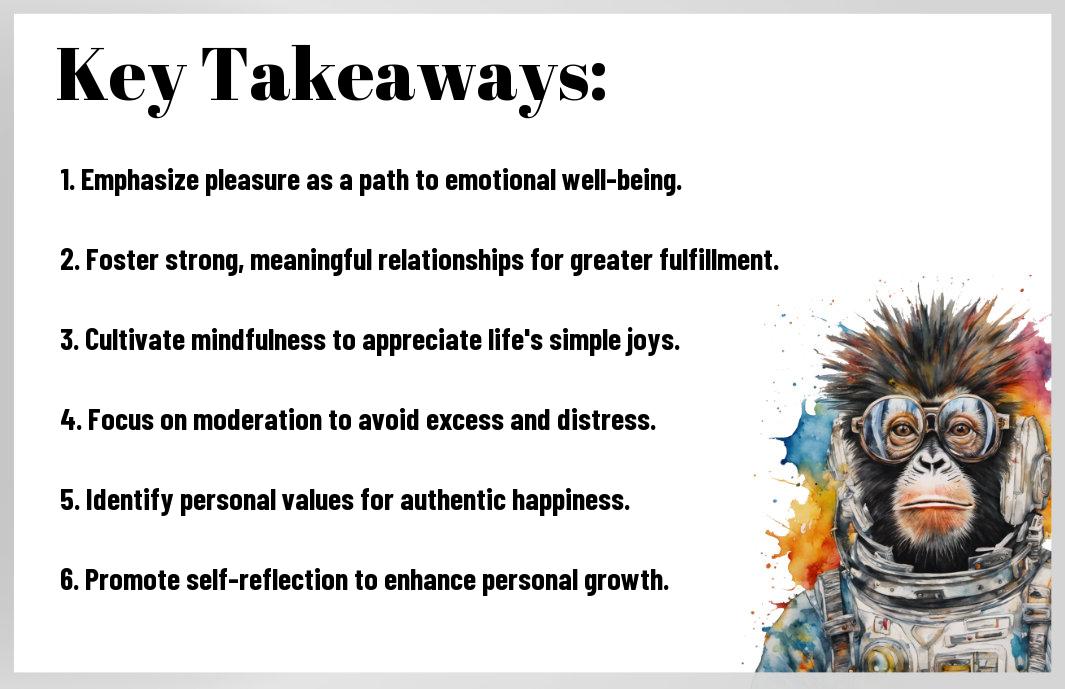You might be surprised to learn that Epicureanism, an ancient philosophy often misunderstood as mere indulgence, actually offers profound insights into achieving lasting happiness. In this post, I’ll explore how incorporating its principles into therapy can help you cultivate a fulfilling and serene life. By focusing on personal pleasure, meaningful relationships, and mindfulness, you can transform your approach to happiness. Let’s investigate how you can apply these timeless ideas in your daily life for greater emotional well-being.
Key Takeaways:
- Hedonism vs. Epicureanism: Distinguish between pleasure-driven hedonism and the more balanced, philosophical approach of Epicureanism, which promotes sustainable happiness through moderation.
- Mindfulness: Incorporate Epicurean principles by practicing mindfulness, focusing on simple pleasures, and appreciating the present moment for deeper, lasting enjoyment.
- Relationships Matter: Emphasize the significance of friendships and meaningful connections in achieving a fulfilling life, as highlighted by Epicurean teachings.
- Avoidance of Pain: Focus on reducing unnecessary pain and anxiety by making informed choices that align with your values and long-term happiness.
- Reflection and Gratitude: Foster an attitude of gratitude through reflection, which can enhance your sense of well-being and contentment.
- Balance and Moderation: Advocate for a balanced lifestyle, ensuring that the pursuit of pleasure does not lead to excess or dissatisfaction.
- Self-Care Practices: Integrate self-care routines that align with Epicurean principles, focusing on activities that bring joy and tranquility into daily life.


What is Epicureanism?
A fundamental aspect of human nature is the pursuit of happiness, and Epicureanism offers one of the most intriguing paths toward that goal. Developed by the ancient Greek philosopher Epicurus, Epicureanism is not merely a hedonistic philosophy, as sometimes misconstrued, but rather a comprehensive approach to living well. At its core, it encourages us to seek pleasure while also advising us to avoid pain, allowing us to cultivate a life rich with joy and tranquility. By understanding and practicing Epicurean principles, I believe you can achieve a balance that leads to lasting happiness.
The Philosophy of Pleasure
The essence of Epicureanism lies in its philosophy of pleasure, which is focused on the idea that true happiness comes from the pursuit of simple, sustainable pleasures rather than indulgent excesses. Epicurus believed that physical desires are often rooted in ignorance, leading us to chase fleeting satisfactions instead of meaningful experiences. I find this perspective refreshing, as it encourages me to take a step back and appreciate the moments of joy that are found in everyday life, from sharing a meal with loved ones to enjoying a peaceful afternoon in nature.
Myths and Misunderstandings
Across numerous cultures, Epicureanism has often been misrepresented as a philosophy that promotes a life of indulgence or hedonism without limit. Many people think it advocates for continuous pleasure-seeking, leaving behind any sense of responsibility or consequence. However, this understanding is far from the truth. Epicurus taught that the highest pleasure is actually derived from the cultivation of virtues such as friendship, moderation, and wisdom. I find it important to highlight these qualities, as they play a vital role in achieving lasting happiness.
In fact, much of the misunderstanding around Epicureanism stems from a shallow interpretation of the word “pleasure.” The ancient philosopher distinguished between higher pleasures, which are intellectual and timeless, and lower pleasures, which are transient and often lead to pain. By focusing on developing meaningful relationships and appreciating life’s simple joys, you can break free from the myth of reckless indulgence and embrace a more fulfilling approach to happiness that honors Epicurean principles.
The Connection Between Epicureanism and Happiness
There’s a profound connection between Epicureanism and the pursuit of lasting happiness. At its core, Epicureanism teaches us that true happiness comes from seeking pleasures that are sustainable and rooted in our relationships, experiences, and personal values. Instead of chasing fleeting moments of joy, Epicurus encourages us to cultivate a life filled with meaningful connections and simple joys. By understanding this philosophy, I have found it becomes easier to focus on what genuinely brings fulfillment, rather than what society might dictate as success or happiness.
Redefining Happiness
Happiness, in its most authentic form, is about finding contentment in everyday moments. Often, I find myself caught in the whirlwind of life, chasing after goals that I think will bring me joy, only to discover that it’s the small, simple pleasures that truly resonate with my spirit. Epicureanism asks us to pause and reflect on what satisfies our deeper needs. When I embrace this perspective, I allow myself the freedom to experience happiness in naturally occurring experiences, like a shared laugh with a friend or the comfort of a quiet evening at home.
The Balance of Pleasure and Pain
Redefining the way I view happiness also involves accepting the inevitable presence of pain in life. According to Epicurean thought, pleasure and pain are two sides of the same coin. Just like me, you might notice that periods of discomfort can enhance your appreciation for the joyous moments. Learning to navigate through these contrasting feelings allows for a more well-rounded understanding of happiness. When I accept pain as a part of my journey, it makes the pleasurable moments even richer, helping me to create a balance that fosters long-term contentment.
Considering both pleasure and pain in our lives can profoundly influence how we attain joy. Embracing the lessons of hardship can cultivate resilience, allowing me to relish my achievements and celebrate the lighter side of life more fully. Epicureanism invites you to explore this balance, reminding you that the highs and lows together shape your unique narrative. In doing so, you create a deeper appreciation for life’s experiences, enhancing your overall happiness in a sustainable way.
Practical Applications in Therapy
Your journey towards incorporating Epicureanism in therapy can be deeply enriching. By actively seeking pleasure and minimizing pain in a balanced way, you can enhance your overall well-being. Whether it’s through understanding your own desires or learning to connect with your feelings, I want you to explore practical applications that can transform the way you approach happiness. This isn’t just about fleeting moments of joy but rather fostering a sustainable sense of contentment in your life.
Techniques for Cultivating Pleasure
Therapy offers a variety of techniques that can help you identify and cultivate pleasure in your daily routines. One approach is to engage in activities that bring you joy, whether that’s savoring a delicious meal, spending time outdoors, or immersing yourself in a creative pursuit. I encourage you to take note of these moments and see how they make you feel, allowing yourself to fully experience the joy they provide. Additionally, journaling about these experiences can be beneficial; it helps you understand what truly resonates with you and brings happiness to your life.
Mindfulness and Self-awareness
Across my experiences with clients, I’ve seen how mindfulness and self-awareness can significantly enhance our connection with pleasure. By incorporating mindfulness practices, such as meditation or deep-breathing exercises, you can ground yourself in the present and tune into your senses. This practice not only helps you enjoy life more but also enables you to identify what truly matters to you. It’s about learning to savor each moment without rushing past it, as well as being kind to yourself in recognizing your needs and desires.
This journey into mindfulness encourages you to embrace your thoughts and feelings without judgment. By being aware of the present moment, you can better understand what brings you joy and fulfillment. Establishing a consistent mindfulness practice can help to create a positive feedback loop—where greater awareness leads to more pleasure in your life, further enhancing your overall happiness. It’s about fostering a deeper relationship with yourself and your experiences, opening the door to living more fully and appreciating the wealth of pleasures life has to offer.
Overcoming Challenges with Epicurean Principles
Keep in mind that life is full of ups and downs, and sometimes negativity can feel overwhelming. When I find myself facing negative emotions, I enjoy reflecting on the Epicurean principle of seeking pleasure in simple joys. Rather than allowing these emotions to consume me, I focus on finding small sources of happiness around me, whether it’s a favorite book, a warm cup of tea, or a walk in nature. By consistently nurturing these tiny pleasures, I cultivate a more positive frame of mind, helping me navigate through the storm of emotions with grace. I have learned that acknowledging my feelings is just as important as finding ways to uplift myself, creating a healthy balance that allows me to process and move forward.
Navigating Negative Emotions
One of the Epicurean teachings that resonate with me is the notion of understanding that negative emotions are a natural part of the human experience. They serve as signals that something in my life may need attention or a shift in perspective. When anger, sadness, or anxiety arise, I try not to shy away from these feelings. Instead, I use them as opportunities for growth and self-reflection. Understanding that these emotions can lead me to a deeper understanding of myself has been eye-opening. It’s about embracing the full spectrum of emotions, knowing that they will eventually pass and that there is always a path toward contentment.
Building Resilience
By applying the principles of Epicureanism, I have discovered that resilience can be cultivated through intentional practices. I focus on the importance of gratitude and savoring the moments that bring me joy. By regularly reflecting on what I am thankful for, I fortify my mindset against challenges. This practice helps me recalibrate when life throws obstacles my way, reminding me that every setback can be a setup for growth and learning. I have found that leaning into community and forming connections also plays a key role in building my resilience. Sharing experiences with others and supporting one another nurtures a sense of belonging and encourages me to keep pushing forward.
In addition, I have also learned that resilience is not just about bouncing back but also about bending and adapting when necessary. Being able to reframe my thoughts—recognizing that each challenge is an opportunity for development—has empowered me to approach situations with a positive mindset. Incorporating regular self-care routines, such as meditation and mindfulness, reinforces this resilience by helping me stay grounded amidst life’s unpredictability. Over time, I notice my capacity to overcome difficulties strengthens, making me more equipped to handle whatever comes my way with a sense of tranquility and confidence.

Success Stories: Epicureanism in Action
Real-Life Transformations
Not every journey towards happiness follows the same path, but I’ve witnessed some truly inspiring transformations when people embrace Epicureanism in their lives. Around six months ago, I started working with a client named Sarah who was feeling overwhelmed by the pressures of work and personal expectations. Through our sessions, we explored the principles of Epicureanism, focusing on enjoying simple pleasures and nurturing her relationships. As Sarah began to prioritize her self-care, she found joy in daily activities she had overlooked, like evening walks and cooking with her family. It’s incredible to see how these small shifts can create a ripple effect, leading to a more fulfilled life. Today, Sarah expresses feeling more at peace and connected with the world around her.
Testimonials from Clients
Against the backdrop of my practice, I’ve gathered heartfelt feedback from clients who have experienced the transformative power of Epicureanism. For instance, Mark, who struggled with anxiety, shared how he has learned to appreciate the little things that bring him joy—like sipping a warm cup of coffee each morning. He told me he no longer feels pressured to chase after elusive goals but is now focused on savoring the present. Knowing that he can cultivate happiness through everyday experiences has completely changed his outlook.
In addition to Mark, I often receive messages from clients expressing their gratitude for introducing them to Epicurean concepts. Many report feeling lighter, more content, and far less burdened by the constant comparisons and rat races that society often emphasizes. They highlight how learning to value simple pleasures and authentic connections has shifted not just their perspective on happiness, but also on themselves. It’s truly rewarding to witness their progress and to be a part of their journey toward lasting happiness. Your story could be next, too!
Integrating Epicureanism into Daily Life
Now that we’ve explored the principles of Epicureanism, let’s take the next step and see how we can incorporate these teachings into our everyday lives. Epicureanism isn’t just a philosophy; it’s a way of living that emphasizes the pursuit of pleasure through simple joys and meaningful connections. By making small changes to our daily routines, we can enhance our overall well-being and deepen our appreciation for life’s little treasures.
Simple Practices for Everyday Joy
Everyday moments can be transformed into sources of joy if we approach them with mindfulness. I like to start my day by indulging in a warm cup of tea, taking a few moments to truly savor the taste and aroma. Engaging my senses this way allows me to ground myself and find contentment in simplicity. Throughout the day, I also make an effort to appreciate small pleasures, whether it’s enjoying a delicious meal or taking a leisurely walk in nature. It’s the little things that often bring the most happiness when I take the time to notice them.
Creating a Supportive Environment
Before diving deeper into Epicurean practices, it’s important to create an environment that supports your journey toward happiness. You can start by decluttering your space and surrounding yourself with items that bring you joy and comfort. I find that having plants around or displaying photos of loved ones can lift my spirits significantly. Additionally, I strive to minimize negative influences, whether that’s from people who drain my energy or spaces that feel chaotic. A peaceful environment helps me reflect on what truly matters and encourages me to embrace the pleasures of life fully.
Practices like inviting positive energy into your space can truly enhance your Epicurean experience. I often light candles or diffuse necessary oils to create a calming atmosphere, making it easier for me to unwind and connect with the present. Creating specific areas for relaxation, reading, or even meditative practices can cultivate a sense of sanctuary in your life. By consciously designing your surroundings, you create a backdrop that nurtures happiness and allows you to enjoy the benefits of Epicureanism fully.
Final Words
To wrap up, I believe that embracing Epicureanism can serve as a wonderful guide toward lasting happiness in our lives. By focusing on the simple pleasures and fostering deeper connections with ourselves and others, we create a more fulfilling existence. It’s not about indulging in excess but rather about finding joy in the little things, cultivating gratitude, and practicing mindfulness. Your journey toward lasting happiness can be enriched by these principles, enabling you to appreciate each moment fully. If you’re curious to dive deeper into how Epicureanism can transform your perspective, I recommend checking out Epicureanism Defined: Philosophy is a Form of Therapy.
Furthermore, as you integrate these teachings into your daily routine, you may find a significant improvement in your overall well-being. You have the power to shape your happiness through thoughtful choices and positive actions. Don’t hesitate to explore this ancient philosophy, as it can pave the way to a more contented and tranquil life. I invite you to reflect on your experiences with Epicureanism and see how its principles resonate with your quest for happiness. By blending these ideas with your unique perspectives, you can launch on a transformative journey leading to a more joyful existence.
FAQ
Q: What is Epicureanism and how can it be applied in therapy for lasting happiness?
A: Epicureanism is an ancient philosophical system that advocates for the pursuit of pleasure and the avoidance of pain, but it emphasizes intellectual and emotional pleasures over physical ones. In therapy, Epicurean principles can help individuals identify activities and relationships that provide genuine satisfaction and joy, fostering a deeper understanding of what constitutes a fulfilling life beyond mere momentary pleasures.
Q: How does Epicureanism address the concept of fear and anxiety in therapy?
A: Epicureanism teaches us that many fears, particularly those surrounding death and the future, are often unfounded. By encouraging individuals to focus on the present and engage in activities that bring joy, therapy based on Epicureanism can help reduce anxiety. Techniques such as mindfulness and reflection on what truly matters in life can help clients navigate their fears more effectively.
Q: Can Epicureanism help with the pursuit of goals and ambitions?
A: Yes, Epicureanism emphasizes the importance of pursuing attainable and meaningful goals rather than chasing after material wealth or status. In therapy, individuals can be guided to set realistic life goals that align with their values and personal happiness. This approach helps cultivate a sense of purpose while minimizing the stress associated with societal pressures.
Q: How does social connection play a role in Epicureanism and therapy?
A: Epicureanism highlights the importance of friendships and social connections in achieving lasting happiness. Therapy that incorporates these principles can encourage individuals to build meaningful relationships, fostering a supportive community. This can lead to increased emotional fulfillment and a collective pursuit of happiness.
Q: What techniques might therapists use to integrate Epicurean principles into sessions?
A: Therapists may use techniques such as guided reflection, journaling, and exercises that promote gratitude and mindfulness. By helping clients identify and prioritize what truly brings them joy, therapists can guide them toward creating a lifestyle more aligned with Epicurean principles, fostering greater contentment and satisfaction.
Q: Are there any misconceptions about Epicureanism that should be clarified in a therapeutic context?
A: A common misconception is that Epicureanism promotes indulgence in excess or hedonism. In therapy, it’s important to clarify that true Epicureanism encourages moderation and the thoughtful pursuit of pleasures that lead to long-term happiness, rather than short-lived gratification. This understanding can help clients develop a more balanced approach to pleasure in their lives.
Q: How can individuals assess whether they are living an Epicurean lifestyle?
A: Individuals can assess their lifestyle by reflecting on their daily activities and relationships. Questions to consider include: Are they engaging in activities that bring joy? Do their relationships provide emotional support? Are they prioritizing their mental well-being over material gains? Engaging in therapy can also provide insights and guidance in this assessment process, helping individuals realign their lives with Epicurean values.


